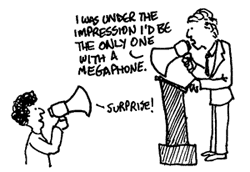- Home
- Blogs
- Rob Cottingham's blog
- Using social media to turn your next speech into an ongoing conversation
The social speechUsing social media to turn your next speech into an ongoing conversation
- 27 November, 2011
- 4 comments

For all the effort that goes into a speech - especially a big one - they're over surprisingly quickly. You reach a few dozen, a few hundred or (if you have a huge crowd) a few thousand people for a brief while, and then you walk off the stage, and the audience walks out the door.
For a few minutes, you've made a significant connection with those people. But all the potential relationships and conversations that could arise from that connection walk out the door with them.
That's why a growing number of speakers are using social media and online networks to start building those relationships, and expand both their audience and their impact. From Twitter hashtags to YouTube clips, public speaking - the oldest broadcast medium there is - is rapidly embracing the digital realm.
And over the next few weeks, this blog will look at some of the ways you can use social tools to turn those one-speech stands into ongoing relationships.
I can imagine a lot of speakers' and speechwriters' hackles going up right now. You're already going to an incredible amount of effort: writing, reviewing, rehearsing, preparing slides. Why would you add even more work?
Actually, because you're going to so much effort. You want to see as much of a return as possible on all that hard work. And just as social tools have dramatically increased the potential audience for everyone from writers to photographers to (cough) cartoonists, they can do (and are doing) the same for speakers.
You have an audience far outside the walls of whatever meeting room, banquet hall or conference center you're in. Why not address them too? And for that matter, the people who are attending your speech are probably going to be interested in what you have to say before and after your speech as well as during those 20 minutes when you're behind the mic. Why not give them a way to engage with you apart from sitting and passively listening?
 And while right now that's an opportunity to stand out from the crowd, it won't long before it's the norm. Audience expectations are changing, as nearly every one-to-many communication channel they use is opening up to many-to-many conversation. It won't be long before participating in Twitter backchannels is the minimum level of engagement many speakers are expected to offer.
And while right now that's an opportunity to stand out from the crowd, it won't long before it's the norm. Audience expectations are changing, as nearly every one-to-many communication channel they use is opening up to many-to-many conversation. It won't be long before participating in Twitter backchannels is the minimum level of engagement many speakers are expected to offer.
Just what that looks like differs from speaker to speaker. For some, it means expanding their reach by posting clips from their speech on YouTube and Vimeo, and uploading the slides to Slideshare. For others, it means crowdsourcing some of their material by posing questions on LinkedIn and Facebook. And for still others, it means carrying on conversations with their online and face-to-face audiences — via their blogs before and after their speech, and via a hashtag-based chat while they're on-stage.
All of this can be powerful... but much more so when those individual tools are integrated into an overall strategy to connect, converse and collaborate.
One caveat: there aren't any guarantees. It's not like social media magic will turn a dull speech into a viral success (at least, not one you'll appreciate - a few million views on a YouTube video labelled "Can You Believe How Long This Guy Goes On About Carriage Bolts?" may not be what you're looking for.)
But when you do have a compelling message (and what other kind of speech is really worth giving?) then your network can magnify it many times over - and help it become a conversation with many of the people you want to reach the most.
Work Smarter with Evernote

Get more out of Evernote with Alexandra Samuel's great new ebook, the first in the Harvard Business Press Work Smarter with Social Media series!




Comments
Bryan Weller says
I've felt this disconnect in the past. I admit more before the rise of Social Media. You go to a conference or event and see a great speaker, you get all pumped up, then they are largely gone from your life. It means so much more if speakers and attendees can build upon these moments after the event. A a speaker, you're just setting yourself up for more success by making it easier for people to keep in touch with you later.
Rob Cottingham says
Very well put! Even if you just lay the groundwork for a future connection, you've done more than 99% of the speakers I see.
Daphne Gledhill says
To add on, I think it would be nice to maybe upload a podcast of your speech and let talk stir around that. Eventually, you can even follow up with a second podcast and voice some of the opinions of the public. Thanks for the tips.
Daphne Gledhill
Free Email Marketing
WilliamE says
I agree with you that social media now is very vital and important, so that's why we need to really improve the ways on how we use this new vessel of information.